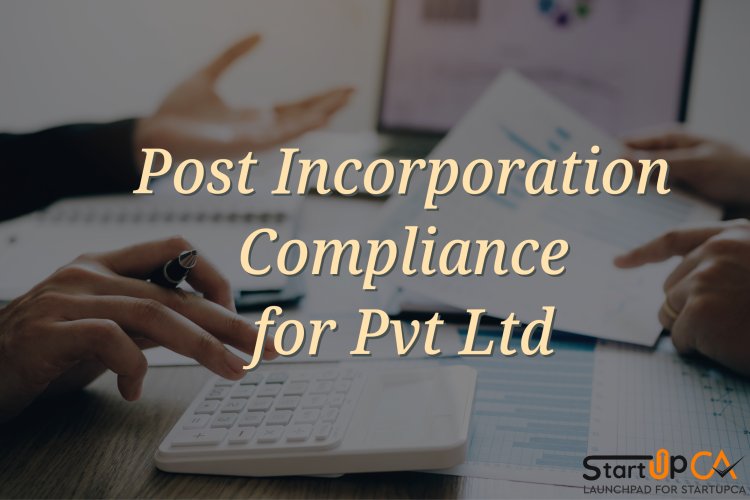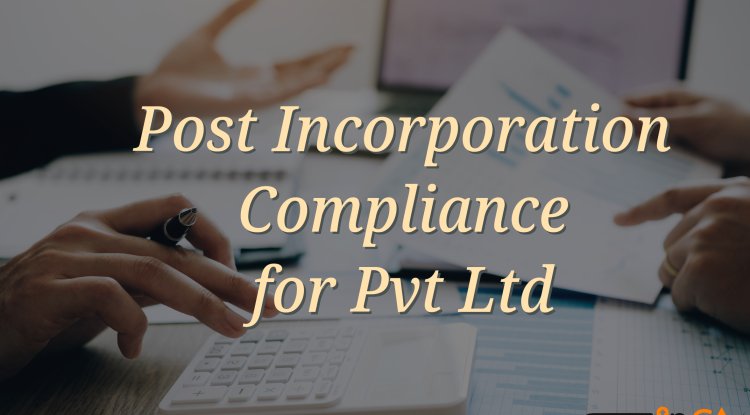Compliances that need to be done after the Company Incorporation.
The private limited company registration grants you access to crucial advantages, including the ability to add shareholders, attract the best talent with equity, and readily raise loans. However, there is no free supper. To demonstrate your eligibility for these benefits, you must comply with the rules and regulations of the Companies Act, 2013, beginning on the date of your incorporation. This article is a comprehensive guide to all post-incorporation compliance requirements that must be met within two months.

1. Auditor's Appointment
After you have gotten the Certificate of Incorporation for your company, one of the first things you need to do is appoint the first auditor for the firm. This is one of the first orders of business. The firm's Board of Directors is required to conduct a board meeting and select an auditor for the business within the first thirty days after the day the company was officially registered. In the event that the Board is unable to select an auditor within the allotted amount of time, it is obligated to inform the members of the company. The members of the company may then, at an Extraordinary General Meeting, select the first auditor for the company within ninety days of being informed of the Board's failure to select an auditor. The term of office for the auditor who is afterwards appointed is to last until the close of the very first Annual General Meeting.
2. Disclosure of Director's Interests and Disqualification Declaration
Given that certain post-incorporation compliances require the Board of Directors of the company to hold a board meeting (see above) within 30 days from the date of registration of the company, the directors of the company will be required to disclose their concern or interest in other companies or bodies coporate, firms or other associations of individuals and declare that directors are not disqualified (according to Section 164). In addition, the directors of the company will be required to declare that they are not disqualified from serving as directors. These disclosures are to include directorship as well as shareholder information. This is a requirement that must be met on a continuing basis; the Companies Act mandates that directors must declare any and all additional interests they hold at regular intervals.
3.Requirements for Registered Office
The company is needed to have a registered office as of the 15th day following its incorporation and at all times thereafter. This office must be able to receive and acknowledge any communication or notices that are delivered to it. Within a period of thirty days following the date of the company's establishment, the business must submit to the Registrar of Companies a form known as INC-22 in order to verify the location of its registered office. In addition, each and every business must:
- Paint or affix its name and the address of its registered office, and keep the same painted or affixed on the outside of every office or location where its business is carried out, in a prominent position and in readable letters. ii. keep the same painted or fastened on the outside of every office or place where its business is carried out. This sign has to be written in either English or one of the other major languages spoken in the area;
- Having its name etched on its common seal, if it has one, using characters that can be read;
- Have its name, address of its registered office, and the Corporate Identity Number (CIN) printed in all of its business letters, letter papers, and letterheads, as well as in all of its notices and other official publications; and
A company and every officer who is in default shall be subject to a penalty of Rs. 1,000 for every day during which the default persists, with a maximum penalty of Rs. 1,000,000 in the event of any default in complying with any of these requirements in respect to the registered office etc. A company and every officer who is in default shall be subject to th penalty
4. Share Certificates are Issued to Subscribers
Every firm is required to send the share certificates to the subscribers of the memorandum within a time frame of two months beginning on the date when the company was incorporated. This indicates that the subscriber is responsible for remitting the agreed-upon subscription sum within a period of sixty days starting from the date the company was incorporated.
In the event that the corporation fails to deliver the certificates, they will be subject to a fine with a minimum threshold of 25,000 Indian rupees and a maximum cap of 500,000 Indian rupees. In addition, any official of the company who is found to be in violation of the terms of this agreement will be subject to a fine that begins at a minimum of 10,000 rupees and can go up to a maximum of 100,000 rupees.
5.Declaration of Business Commencement
At the moment that the company's operations are first put into motion, the directors of the firm are required to sign and submit a declaration known as Form 20A. A Chartered Accountant (CA) should check it out to ensure its accuracy.
What's Your Reaction?




















